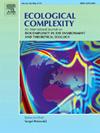Climate change and the shifting dynamics of marine ecology
IF 3.1
3区 环境科学与生态学
Q2 ECOLOGY
引用次数: 0
Abstract
This study presents a four-dimensional mathematical model with time-varying parameters to analyse the diverse effects of global warming on marine ecology over the next 100 years. Key environmental factors, including rising sea surface temperature and decreasing dissolved oxygen concentrations, are evaluated in relation to their influence on plankton species. The model’s predictions are validated through a case study, comparing results with prior research. Findings indicate that rising temperatures accelerate the dilution of dissolved oxygen, significantly affecting plankton densities, with zooplankton being more susceptible to temperature changes than phytoplankton. This reduction in zooplankton and oxygen levels is anticipated to impact overall ocean productivity. The study also proposes a threshold for annual temperature increments aligned with global environmental targets. Additionally, a second model incorporating a time delay examines the period required for phytoplankton-released toxins to impact zooplankton populations. Results suggest that the time delay has minimal long-term effect on marine ecology within the study time frame. Overall, this research provides insights into the impact of atmospheric changes due to global warming on oceanic ecosystems.
气候变化和海洋生态的动态变化
本文提出了一个具有时变参数的四维数学模型,分析了未来100年全球变暖对海洋生态的各种影响。评估了主要环境因素,包括海面温度上升和溶解氧浓度下降对浮游生物种类的影响。通过一个案例研究验证了模型的预测,并将结果与先前的研究结果进行了比较。研究结果表明,温度升高加速了溶解氧的稀释,显著影响了浮游生物的密度,而浮游动物比浮游植物更容易受到温度变化的影响。浮游动物和氧气含量的减少预计会影响整个海洋的生产力。该研究还提出了一个与全球环境目标相一致的年温度增量阈值。另外,第二个包含时间延迟的模型考察了浮游植物释放的毒素影响浮游动物种群所需的时间。结果表明,在研究时间框架内,时间延迟对海洋生态的长期影响最小。总的来说,这项研究为全球变暖导致的大气变化对海洋生态系统的影响提供了见解。
本文章由计算机程序翻译,如有差异,请以英文原文为准。
求助全文
约1分钟内获得全文
求助全文
来源期刊

Ecological Complexity
环境科学-生态学
CiteScore
7.10
自引率
0.00%
发文量
24
审稿时长
3 months
期刊介绍:
Ecological Complexity is an international journal devoted to the publication of high quality, peer-reviewed articles on all aspects of biocomplexity in the environment, theoretical ecology, and special issues on topics of current interest. The scope of the journal is wide and interdisciplinary with an integrated and quantitative approach. The journal particularly encourages submission of papers that integrate natural and social processes at appropriately broad spatio-temporal scales.
Ecological Complexity will publish research into the following areas:
• All aspects of biocomplexity in the environment and theoretical ecology
• Ecosystems and biospheres as complex adaptive systems
• Self-organization of spatially extended ecosystems
• Emergent properties and structures of complex ecosystems
• Ecological pattern formation in space and time
• The role of biophysical constraints and evolutionary attractors on species assemblages
• Ecological scaling (scale invariance, scale covariance and across scale dynamics), allometry, and hierarchy theory
• Ecological topology and networks
• Studies towards an ecology of complex systems
• Complex systems approaches for the study of dynamic human-environment interactions
• Using knowledge of nonlinear phenomena to better guide policy development for adaptation strategies and mitigation to environmental change
• New tools and methods for studying ecological complexity
 求助内容:
求助内容: 应助结果提醒方式:
应助结果提醒方式:


